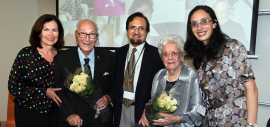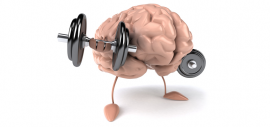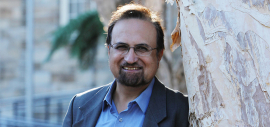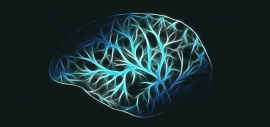Blog: The Brain Dialogues, filtered by tag: Healthy Brains. Positive Ageing
Can an Old Dog Learn New Tricks? Neuroplasticity and Improving Your Memory in Older Adulthood
DR NICOLE KOCHAN, PhD
It is common thinking that as we age our memory function deteriorates. But over the past 20 years, research indicates that even the older brain has a degree of plasticity. This means that the brain has the ability to make new connections between its neurons (or brain cells) in response to various types of stimulation or learning experiences, which in turn can help improve memory and other cognitive skills. It has also been shown that older adults who regularly engage in complex mental activities have a lower risk of dementia. The more, the better!
Based on current… Read More
Positive Ageing
PROFESSOR HENRY BRODATY and PROFESSOR PERMINDER SACHDEV
In historical times, the elderly were highly revered. Wisdom and knowledge were respected and ageing was seen as a positive experience. Over the decades, our opinion of ageing has shifted and certainly in parts of the first-world ageing has become a loaded term. ‘Being old’ is sometimes associated – particularly by many of the younger generation - with health issues and decline. From the perspective of everyone at the Centre for Healthy Brain Ageing (CHeBA), it’s time to stop that trend and re-think the meaning of ageing.
Positive… Read More
What is Successful Ageing?
PROFESSOR PERMINDER SACHDEV, MD, PhD
"How old would you be if you didn't know how old you were?" Satchel Paige (1906-1982)
A great demographic change of the last century has been the ageing of our population. The good news is that we are increasingly living to an older age. At present, about 15% of Australians are aged 65 years or over, and this proportion is likely to be nearly 25% by the middle of the century. A girl born today can expect to live to the age of 94 years and a boy to the age of about 92 years. An increasing number of older people are over the age of 80 years, which is… Read More
Grow Your Brain
NICOLA GATES, PhD
A lifetime of engaging enriching activities has been shown to delay the onset of cognitive decline and dementia. Therefore growing or building up your brain through new experiences gives you credits to reduce possible deterioration.
Brain reserve is a concept to describe a brain’s physical and physiological robustness and resilience against disease and trauma. High reserve is due to the growth of more neurons, more synapses, greater connections and neuronal networks. Cognitive reserve is a related idea to describe how a lifetime of cognitive effort through education,… Read More
Living to 100

DR CHARLENE LEVITAN
Centenarians are the fastest growing age worldwide. We can learn about ageing by studying the extremes, especially those who are models of "successful ageing". So how do we live to 100 in good physical and mental health?
Approximately 30% of longevity is contributed to be our genes. Parents of centenarians live an average age of 10 years longer than the average life expectancy of the population. Centenarians are four times more likely to have a sibling in their early nineties.
The remaining 70% of ingredients relate to the our life style. Montefiore participants in the… Read More
Ageing and Technology
This article was originally published in Montefiore LIFE magazine.
In the 21st century, increases in technological advances are seen to bring a globalised world even closer. Many of Montefiore Home's residents have families scattered all over the globe and their only means of communication with them is through digital technology. However, for many elderly people these newly emerging communications tools appear to favour the younger demographic and the older generation can be left out in the cold. Luckily for them there is a new tool which has been developed specifically to reduce the… Read More
CHeBA Turns One - Our Mission
PROFESSOR PERMINDER SACHDEV and PROFESSOR HENRY BRODATY, CO-DIRECTORS, CHeBA
There is a worldwide effort to identify risk and protective factors, establish biomarkers and develop novel treatments for mild cognitive impairment (MCI), dementia and geriatric depression.
Over the last decade, our group has been a leading contributor to this effort. We established five longitudinal studies of cognitive ageing and dementia along multiple lines of investigation which include neuroepidemiology, neuropsychology, neuroimaging, genetics/genomics, proteomics, stem cells, metabolomics and… Read More
Donating Your Brain to Research
HEIDI DOUGLASS | h.douglass@unsw.edu.au
There are currently approximately 320,000 people in Australia with dementia, with that number set to rise to almost one million by 2050, and 115 million globally. These predictions mean that not only do we need a clear plan to make care available for so many people with dementia, but we also need to pursue prevention strategies vigorously.
Prevention of dementia depends largely upon research, and beyond the necessities of funding, equipment, and academics with the right skill base to perform the research we need one extra thing: brains.
"Even before… Read More
Ageing Well - Living Healthier
PROFESSOR HENRY BRODATY, MD, PhD
Prevention
We all become slower and more forgetful as we age, some of us more than others. When this change is accelerated and interferes with a variety of thinking or cognitive abilities and interferes with our day to day functioning, this is diagnosed as dementia, of which the most common type is Alzheimer’s disease.
Surveys of the population indicate that dementia in general and Alzheimer’s in particular, along with cancer, are the health problems that we generally fear most. Rightly so! As we are living longer the chances of developing a dementia… Read More
Staying Connected Online is a No Brainer
HEIDI DOUGLASS | h.douglass@unsw.edu.au
This article was originally published in Simply Connected on the Tapestry website.
Can staying connected with your friends online keep your brain young?
Research indicates that social activity, in combination with a healthy lifestyle and brain training, actually restores and improves brain function.
In many countries we are ageing at an astonishing rate. For example, in the US, the number of individuals aged 90 years and over is predicted to increase from the current 2 million to more than 8 million by 2050.
Centenarians (those that attain the age… Read More









